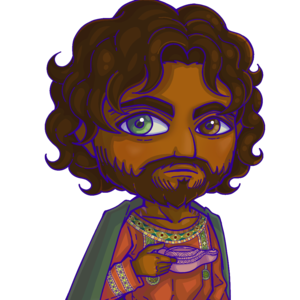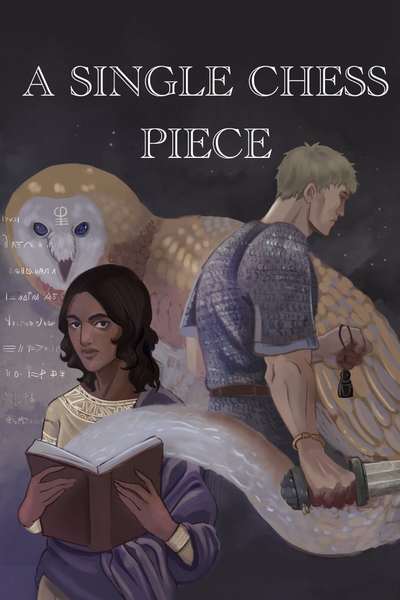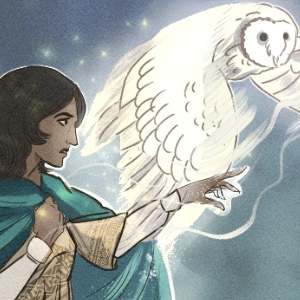About an hour after sunset, Chlodvig and his men finally reached the walls of Thessalonike. For days they rode with only short breaks in between. Their horses foamed after the rough ride. All of the mercenaries wore long, thick cloaks over their armor to dampen the sound and stop their armor from reflecting the moonlight. Not that they needed to worry about that much here. Thessalonike and the area around it seemed to be covered with clouds of dust and smoke. The air was thick. It was a hot August evening and there was little wind. Despite the mistiness, they could clearly see the glow of the fires in the city. Chlodvig, captain of the mercenaries, stood up on his horse. He balanced, standing upright on the saddle, squinting to see into the distance. He scowled and dropped into the saddle again.
“Just like you said Reem, they’re scourging the city.”
Reem nodded, her dark eyes grim and serious. Eirene looked downcast. She too was squinting.
“We’re too late…” she said softly.
Chlodvig was still staring at the city as he muttered in response: “I don’t think so. They must have broken in today. The deserters we met yesterday said that the defense is still going on. So the sack probably only just started and there is a fair chance the women we need are alive. We just need to find them.”
“The archon is probably dead tough. Or captured.” Terwilla, one of Chlodvig’s oldest soldiers said. He was running a scarred hand through his hair, brown but heavily streaked with silver.
“If he was captured, we get him back!” said Eirene forcefully. “But most importantly we need to get to the women! What a shame we have to start with the archon!”
Chlodvig turned around to look at the soldiers. “Eirene, Avar, Kurshan, Jacot, you come with me! The rest of you move back a bit and wait for us. Let the horses rest. Reem, Keto, I want you on lookout. Once we get them out, we will run for it. I want to make it as far away from the city as possible. It’s too close to their camps and there are too many stragglers in its proximity.”
He slipped off the horse’s back and walked up to one of the men who remained on horseback, a Latin knight with a pointed beard and a padded surcoat. The man, Akterion, was holding a small, metal disc in his hand. He took out a knife and gently cut his finger, rubbing his blood on one side of the disc. He whispered a word and then passed the bloodied piece of metal to Chlodvig.
“Here it is Captain! The spell should work for three hours or so. It will grow warm to the touch when you get in a range of 2 millia passuum. The temperature will increase as you get nearer. Up until you are about a canna away from him. If you are going in the wrong direction it’ll start cooling down again.”
Chlodvig nodded. “Good work!” he said shortly. He was glad, yet again, for day when he saved Akterion’s life and demanded the man pay this back by working for the mercenaries for five years. Akterion’s unusual skills, while not strictly military, helped them out in many missions. Life with the mercenaries seemed to suit him, five years stretched into nine. Now, in his tenth year of service, Akterion seemed in no rush to leave. For which Chlodvig was grateful.
Chlodvig reached out his hand to take the metal disk. The blood had dried on it instantly, leaving only a read tinge on one side. It was the lead seal which he received from Alexander Vranas a week earlier, now however, it had a hole in the middle and a few Latin letters scratched on one face. It was strung on a thin chain. He slipped the chain over his neck and pushed the disc under his tunic so that it was touching his skin. With that, he turned and began walking quickly towards the city. His four warriors followed him.
*
They approached the walls cautiously. There were some groups of drunk soldiers camping out beyond the walls. These were poor, insignificant infantry men, not important enough to be allowed to stay in the main camp or in the city. The mercenaries made their way around them without being noticed. The heavy mist and smoke that was coming from the city, as well as the alcoholic stupor of the soldiers, helped with that.
After a short trek they reached the catapults. Earlier, that morning, the powerful siege weapons had rained large stone at the walls of Thessaloniki. Now they lay forgotten. For the time being. An unusually large, heavy trebuchet with a huge stone still lying beside it caught their attention. Jacot, a tall, skinny man with watery blue eyes and a pox-marked face, whistled.
“What a monster! They really didn’t pull their punches did they?” he jumped onto the large stone and put his hand on the wooden arm of the trebuchet. “That’s what must have made the tremors we felt in the morning!” he said in French so that only Chlodvig understood.
Eirene spat onto the stone he was standing on, and growled a bitter curse, damning all the Normans and their mothers to oblivion. While she no longer served the Empire, she was still deeply devoted to it. Jacot, a Norman himself, grimaced awkwardly and rubbed the back of his neck.
“We’re not all that bad, really!” he said. Eirene’s vulgar response befitted a drunken trooper rather than the daughter of a Roman archon.
They walked along the eastern wall for some time looking for the place where the Normans entered the city. The ground was covered with arrows and stones from slings. Dead and wounded men lay on the ground. Some were Norman, others must have been the defenders who had fallen from the walls during the fighting earlier in the day. A man who appeared to have both his legs broken moaned in pain and tried to grab Kurshan’s long coat as they passed him. In a voice thick with pain, he begged them to help him. Kurshan jumped over him lightly, his face unconcerned.
Finally, they reached a section of the wall where the breach was. Tunneling and fire made it crumble down, creating a chasm through which the enemy soldiers entered that morning. Just in front of the chasm, a group of soldiers sat around a small campfire. Clearly they had been meant to guard the entrance. And clearly they felt there is absolutely no need to. Two of the soldiers were sprawled out on the grass, resting, maybe asleep. Another four were eating and comparing loot: random pieces of clothing, jewelry, even pottery. The mercenaries stood in the shadows, looking at them. Chlodvig gave a slight sign with his hand. Three pairs of strong arms drew their bows, almost in unison. Seconds later three of the soldiers slumped to the ground, two with arrows sticking out of their throats, the third shot in the eye. One more opened his mouth to cry out but his shout was cut short as the blade of a throwing axe hit him squarely in the face, killing him instantly. The two men who were lying in the grass struggled to get to their feet, bewildered. Two more arrows flew and one soldier sank to his knees. The last one tried to run. Two swift sword strokes put an end to that. He fell to the ground.
“Rizico” said Jacot, pushing one of the dead men with his foot and inspecting their weapons. The others stared at him blankly. “Rizico,” Jacot explained, “They’re like…pirates? Bandits? They attach themselves to an army but they don’t receive pay. They do it for the loot.”
Eirene threw the dead rizico a disdainful look. Chlodvig pulled out the small throwing axe from the dead man’s skull. He cleaned it silently. Then he stepped into the breach.
On the other side of the wall, the sight was much, much worse. As they expected. Bodies lay strewn around the ground, young and old, women, men, children. Some had died by the sword. Others had been trampled by rushing men and horses. Loose limbs were scattered in places. Some houses were still smoking. Even the animals had not been spared. There were dead dogs and donkeys littering the ground.
There is a certain madness that enters humans during a siege that is unlike anything else in the world. Chlodvig always found it strange that chroniclers, regardless of nation or religion, had a tendency to describe enemy armies as beasts. This did not ring true to him at all. Beast did not have that deep and precise will to humiliate their foes. They did not have that sense of superiority, moral or otherwise, over the ‘Other’. And they did not think of enemies ‘deserving’ to suffer. This was a human concept. In that sense, Chlodvig himself felt that he had always been more beast than man – the concept of ‘deserving’ anything at all, except that which was openly and honestly agreed, did not appeal to him.
To their right, just under the wall, a group of soldiers was in the process of killing some prisoners. There were five prisoners, all men, dressed in typical Roman military tunics but without armor or weapons. The Normans probably caught them hiding out or trying to escape the city. A swift slit to the throat, and man after man slumped to the ground. The seven soldiers were hacking away at the bodies when the leader, a knight wearing a red and blue surcoat, heavy maille, and a helmet with a protective plate over the face, looked up. He noticed the mercenaries as soon as they noticed him.
He took a swift few steps in their direction and demanded in a loud snarl:
“Who the bloody hell are you!?”
His voice was muffled by the metal mask over his face.
Chlodvig shot a glance up at the wall. There, above them, stood three crossbowmen. They were staring and waiting for the Norman knight’s orders.
“Avar! Up!” Chlodvig growled loudly. Before even finishing the order, he was already leaping through the air towards the knight. Mid-jump he pulled out his sword and raised his shield. The crossbowmen fired. Three bolts hit, lodging themselves deep in wood of the shield. The fourth one flew past his right shoulder and hit Eirene’s shield. She had raised it as soon as she saw Chlodvig glance at Avar. Mouth set, she and Kurshan both rushed into the fray after their commander. Chlodvig reached the Norman knight in seconds. The knight jumped out to meet him. Chlodvig lightly stepped around him and plunged his sword into the chest of the crossbowman nearest to him. Then he span round, blocking the attack of the Norman knight who tried to strike his side. Before the Norman had time to step back, he rammed the shield into the man’s side with a force that sent the heavily armored knight flying. As the knight raised his head, he saw the tall mercenary looming over him. He caught a glimpse of shining steel, then the mercenary’s sword thrust right through the eye slits of his metal mask, cutting through bone and brain. He died instantly, without much pain.
Two of the crossbowmen lost their nerve at this point. Dropping their crossbows they started to run towards the via Regia. They didn’t notice Jacot who, during the initial commotion, had circled around the fighters in the front and now attacked the two running soldiers from the flank. He didn’t even try to parry their rather flimsy attacks; his heavy maille easily endured the blows. Jacot made short work of both men and turned to look to Eirene and Kurshan, checking if they needed his help. They didn’t. Eirene, face sprayed with blood, was standing with her hands on her hips, two soldiers dead at her feet. Kurshan had just decapitated another.
Above them, on the wall, Avar was just pushing the corpses of the other three off the wall, onto the ground on the other side. Chlodvig grabbed the dead knight and one of the crossbowmen and dragged the bodies through the chasm in the city wall. The rest of the mercenaries followed suit. They hid the bodies on the other side, just outside the city. Someone would notice sooner or later, but with luck, it would give them some time, before other patrols noticed the missing men.
“That” said Kurshan offhandedly, “was what I call unlucky!”
Chlodvig grimaced annoyed. Reem and Keto, who scouted the area earlier, said this section of the wall wasn’t guarded well. They were rarely wrong. So it had to be chance that brought the patrol, led by a knight no less, here exactly at the moment they entered. Or was it?
He looked around, trying to get a good look at the towers where the Normans must have placed lookouts after they took the city. Luckily for now, their little scuffle with the patrol remained unnoticed. He started walking quickly towards the center of the city. Now came the hard part – finding a single man in a city full of soldiers, prisoners and corpses.
________________
Places:
Via Regia - main road in a Byzantine city
Forum – central plaza of a Roman city, often where the administrative buildings were located. In Thessalonike the theatre was located there too though that dropped out of use by the 7th century.
Things:
Surcoat – a sleeveless garment particularly popular in the 13th and 14th century often worn over armor. It often had a knight’s coat of arms on it, or was dyed in the colors of his family. Women also wore surcoats but they went over the lower tunic and had a different shape than the male surcoat.
millia passuum - Roman unit of measurement. That’s where we get the word ‘mile’ from. It was around 1.5 kilometers (0.93 mi). Literally it translates as ‘1000 paces’.
canna- medieval unit of measurement, around 2 meters
Trebuchet – a type of catapult. There were two kinds of trebuchets – the older, traction trebuchet and the newer, counterweight trebuchet. The counterweight trebuchet only emerged in the 12th century. It was an extremely powerful weapon with a huge range. They often received names. The biggest one during the siege of Thessaloniki in 1185 was called the ‘Mother of Earthquakes”!
Archon – a Byzantine aristocrat.











Comments (19)
See all